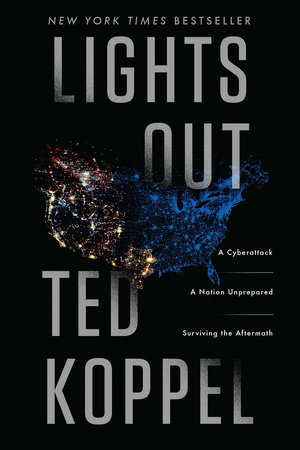Lights Out
Lights Out: A Cyberattack, A Nation Unprepared, Surviving the Aftermath by Ted Koppel is an incredible expose into what will happen if (or more likely, when) a cyberattack takes out the electric grid of the United States. I've been interested in this subject and EMPs since reading Terri Blackstock's Restoration series, so when I saw Koppel's book on the power grid failing I immediately picked it up. I'm not a doomsday sayer or prepper by any means imaginable, but I feel like this is a true threat and problem that the United States needs to address and deal with, since it's such an easy way to cripple our country. The book description reads:
"In this tour de force of investigative reporting, Ted Koppel reveals that a major cyberattack on America’s power grid is not only possible but likely, that it would be devastating, and that the United States is shockingly unprepared.
Imagine a blackout lasting not days, but weeks or months. Tens of millions of people over several states are affected. For those without access to a generator, there is no running water, no sewage, no refrigeration or light. Food and medical supplies are dwindling. Devices we rely on have gone dark. Banks no longer function, looting is widespread, and law and order are being tested as never before.
It isn’t just a scenario. A well-designed attack on just one of the nation’s three electric power grids could cripple much of our infrastructure—and in the age of cyberwarfare, a laptop has become the only necessary weapon. Several nations hostile to the United States could launch such an assault at any time. In fact, as a former chief scientist of the NSA reveals, China and Russia have already penetrated the grid. And a cybersecurity advisor to President Obama believes that independent actors—from “hacktivists” to terrorists—have the capability as well. “It’s not a question of if,” says Centcom Commander General Lloyd Austin, “it’s a question of when.”
And yet, as Koppel makes clear, the federal government, while well prepared for natural disasters, has no plan for the aftermath of an attack on the power grid. The current Secretary of Homeland Security suggests keeping a battery-powered radio.
In the absence of a government plan, some individuals and communities have taken matters into their own hands. Among the nation’s estimated three million “preppers,” we meet one whose doomsday retreat includes a newly excavated three-acre lake, stocked with fish, and a Wyoming homesteader so self-sufficient that he crafted the thousands of adobe bricks in his house by hand. We also see the unrivaled disaster preparedness of the Mormon church, with its enormous storehouses, high-tech dairies, orchards, and proprietary trucking company – the fruits of a long tradition of anticipating the worst. But how, Koppel asks, will ordinary civilians survive?
With urgency and authority, one of our most renowned journalists examines a threat unique to our time and evaluates potential ways to prepare for a catastrophe that is all but inevitable."
An investigative book about this subject of course has the potential to be dry, but Ted Koppel manages to take the subject and present it in such a way that I felt like I was reading a futuristic or science fiction thriller. However (unfortunately) the threat is all too real and the points he makes are valid. I was glued to the pages and couldn't put it down. He delves into just about every aspect of how a cyberattack like this could happen, exactly what the consequences would be, and how unprepared America is for such an attack. I feel like his book is so important because it shines a spotlight on a weakness we have and hopefully it will make people sit up and take notice. I recommend this book to anyone who's interested in educating themselves about this topic.
I received a copy of this book from Blogging For Books in exchange for an honest review. All opinions are my own.


Comments
Post a Comment